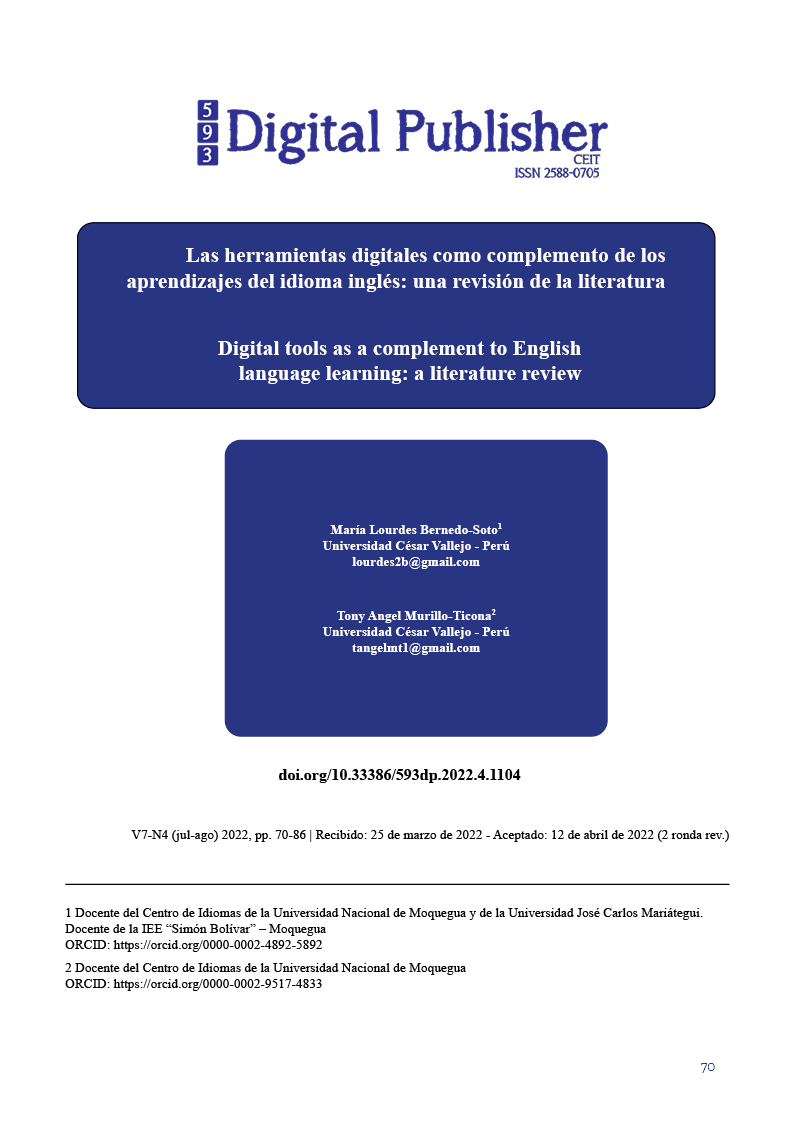Digital tools as a complement to English language learning: a literature review
Main Article Content
Abstract
Nowadays, digital tools play a very important role in the development of the contemporary edu-cational process, which is why both teachers and students have strengthened their digital compe-tences, making the learning process much more meaningful, especially in the acquisition of a for-eign language such as English.
This systematic review work aims to demonstrate the positive impact of digital tools as a com-plement to meaningful learning in English language acquisition, for this purpose a review of the scientific literature from 2018 to 2021 has been developed, as well as considering the databases that consider issues in relation to the approached, being mostly two of the most relevant for the research such as EBSCO Host as well as ERIC.
The results describe the direct relationship between the use of digital tools and the development of skills that allow an effective acquisition of the English language, so it is concluded that the use of these tools is a task that should be disseminated and encouraged by educational institu-tions that are in charge of students in the process of learning foreign languages such as English.
Downloads
Article Details

This work is licensed under a Creative Commons Attribution-NonCommercial-ShareAlike 4.0 International License.
1. Derechos de autor
Las obras que se publican en 593 Digital Publisher CEIT están sujetas a los siguientes términos:
1.1. 593 Digital Publisher CEIT, conserva los derechos patrimoniales (copyright) de las obras publicadas, favorece y permite la reutilización de las mismas bajo la licencia Licencia Creative Commons 4.0 de Reconocimiento-NoComercial-CompartirIgual 4.0, por lo cual se pueden copiar, usar, difundir, transmitir y exponer públicamente, siempre que:
1.1.a. Se cite la autoría y fuente original de su publicación (revista, editorial, URL).
1.1.b. No se usen para fines comerciales u onerosos.
1.1.c. Se mencione la existencia y especificaciones de esta licencia de uso.
References
Alghamdi, Y., Alghamdi, A., & Alsolami, T. (2019). English Language Teaching: Historical Overview, Current Issues and Suggestions for Enhancing Speaking Proficiency in EFL Contexts. Arab World English Journal (AWEJ), 10(2), 270–283. https://doi.org/10.24093/awej/vol10no2.21
Anak, C., & Kim, T. (2021). Exploring a gamified learning tool in the ESL classroom: The case of Quizizz. Journal of Education and E-Learning Research, 8(1), 103–108. https://doi.org/10.20448/JOURNAL.509.2021.81.103.108
Belda-Medina, J. (2020). El Aprendizaje del inglés (L2) mediante herramientas digitales (TIC) por estudiantes mayores desde un modelo andragógico y heutagógico. Tonos Digital, 38(I), 1–24.
Bobkina, J., Domínguez, E., & Gómez, J. (2020). Educational Mini-Videos As Teaching and Learning Tools for Improving Oral Competence in Efl/Esl University Students. Teaching English with Technology, 20(3), 85–95.
Borja, G., & Carcausto, W. (2020). Herramientas digitales en la educación universitaria latinoamericana: una revisión bibliográfica. Revista Educación Las Américas, 10(2), 254–264. https://doi.org/10.35811/rea.v10i2.123
Burgos, D. (2020). Un nuevo paradigma en la enseñanza universitaria basado en competencias digitales para profesores. Campus Virtuales, 9(2), 71–82.
Camey, O. (2018). Una Mirada a la Generación Millennials y el uso de la Telefonía móvil como Herramienta de apoyo en el Proceso de Aprendizaje. Revista Académica ECO, 19, 1–13.
Cano, A. B. S. (2018). Enseñar Literatura En Lengua Extranjera Con Herramientas Digitales: Reflexiones Generales Desde La Didáctica De Fle1. Tonos Digital, 35, 1–23.
Carrión, E. (2018). Experiencias TIC en la enseñanza bilingüe mediante recursos digitales musicales. DIM: Didáctica, Innovación y Multimedia, 0(36).
Cedeño, M. R., Lucas, Y. A., Ponce, E. E., & Peredo, V. E. (2020). Classroom y Google Meet, como herramientas para fortalecer el proceso de enseñanza- aprendizaje. Polo Del Conocimiento, 5(07), 388–405. https://doi.org/10.23857/pc.v5i7.1525
Fahmi, B., & Pratolo, N. (2020). Dynamic assessment effect on speaking performance of indonesian efl learners. International Journal of Evaluation and Research in Education, 9(3), 778–790. https://doi.org/10.11591/ijere.v9i3.20466
García, N. (2018). El acceso a la Red en las aulas aumenta el aprendizaje - elEconomista.es. https://www.eleconomista.es/ecoaula/noticias/9175614/05/18/El-acceso-a-la-Red-en-las-aulas-aumenta-el-aprendizaje.html
Guerrero, B. (2020). Methodology for the use of webquest in teaching spanish as a foreign language | Metodología para el uso de las webquest en la enseñanza de ele. Revista Electronica de Linguistica Aplicada, 19(2), 24–47.
Guevara, L. A., Magaña, E. A., & Picasso, A. L. (2019). El uso de Google Classroom como apoyo para el docente. Conisen, 1–14.
Gülşah, Z. (2020). How participatory is language teacher education?: Trainees’ perspectives. In International Online Journal of Education and Teaching (IOJET) (Vol. 7, Issue 1). Informascope. 3251 Cadde Kozlu Evler 2/49 Yasamkent, 06800, Turkey. e-mail: iojetmail@gmail.com; Web site: https://iojet.org/index.php/IOJET.
Jaroenkitboworn, K. (2020). Funny English in the digital world. LEARN Journal: Language Education and Acquisition Research Network, 13(1), 39–61.
Juárez, C., & Perales, M. (2019). Experiencias en el aprendizaje del inglés en la educación superior. Lenguaje, 47(2), 358–378. https://doi.org/10.25100/lenguaje.v47i2.6734
Kabak, K., & Tuğrul, A. (2021). The effect of students’ developing their own digital games on their academic achievement and attitudes towards for english lessons. Participatory Educational Research, 8(2), 74–93. https://doi.org/10.17275/per.21.30.8.2
Kara, S. (2019). Learning autonomy, digital learners and Google Education: a rhizomatic English syllabus framework. The EuroCALL Review, 27(1), 30. https://doi.org/10.4995/eurocall.2019.10709
Kazemi, S., Ashraf, H., Motallebzadeh, K., & Zeraatpishe, M. (2020). Development and validation of a null curriculum questionnaire focusing on 21st century skills using the Rasch model. Cogent Education, 7(1). https://doi.org/10.1080/2331186X.2020.1736849
Khamis, H., & Al-Zaabi, A. (2021). The impact of COVID-19 on English language teaching in Oman. International Journal of English Language Teaching, 9(3), 14–19. https://www.eajournals.org/wp-content/uploads/The-Impact-of-COVID-19-on-English-Language-Teaching-in-Oman-Final.pdf
Korkut, P., & Çelik, Ö. (2018). Developing pronunciation through creative drama. Language Learning Journal, 49(2), 147–159. https://doi.org/10.1080/09571736.2018.1491058
Levan, L., Diaz, S., Guillen, P., Tello, S., Herrera, N., & Collantes, Z. (2019). Digital competences in education. Propositos y Representaciones, 7(2), 569–588.
Martínez-Pérez, M. G. (2020). Herramientas digitales para la enseñanza del idioma inglés Digital Tools to Facilitate the Learning of the English Language. Publicación Semestral, 7(3), 28–32. https://repository.uaeh.edu.mx/revistas/index.php/prepa3/article/view/6112/7359
Morales, C., Vargas, J., & Ramírez, A. (2021). Luchas y competencias digitales de los profesores de inglés durante la pandemia de Covid-19. Revista Boletín Redipe, 10(2), 98–108. https://doi.org/10.36260/rbr.v10i2.1198
Muslem, A., Yusuf, Y. Q., & Juliana, R. (2018). Perceptions and barriers to ICT use among English teachers in Indonesia. In Teaching English with Technology (Vol. 18, Issue 1). IATEFL Poland Computer Special Interest Group / University of Nicosia / Maria Curie-Sklodowska University. Ul. J. Sowinskiego 17, 20-041 Lublin, Poland. Web site: http://tewtjournal.org. http://www.tewtjournal.org
Niehaus, E., & Nyunt, G. (2020). Identifying meaningful individual-level change in educational experiences: Adding to our methodological toolkit. Journal of College Student Development, 61(5), 637–643. https://doi.org/10.1353/csd.2020.0060
Novoa-palacios, A. (2019). PREPRINT : Liderazgo Integral Educativo Innovador en las. 1–24.
Padilla, N., Cayambe, A., & Lara, L. (2018). La multimedia aplicada al Idioma Inglés. Recursos para la enseñanza de vocabulario en nivel universitario. Dilemas Contemporáneos: Educación, Política y Valores, 3(29), 1–13.
Palacios, F. J., Gómez, M. E., & Huertas, C. A. (2020). Digital and media competences: Key competences for EFL teachers. Teaching English with Technology, 20(1), 43–59.
Pasaribu, T. A. (2020). Challenging efl students to read: Digital reader response tasks to foster learner autonomy. Teaching English with Technology, 20(2), 21–41.
Pesantez-Arcos, K. D. R., García-Herrera, D. G., Ochoa-Encalada, S. C., & Erazo-Álvarez, J. C. (2020). Trabajo colaborativo y herramientas digitales para la enseñanza-aprendizaje en la educación en línea del bachillerato. Revista Arbitrada Interdisciplinaria Koinonía, 5(5), 68. https://doi.org/10.35381/r.k.v5i5.1034
Ruiz-San-Miguel, F. J., Ruiz-Gomez, L. A., Hinojosa-Becerra, M., & Maldonado-Espinosa, M. (2020). Uso de Instragram como herramienta de debate y aprendizaje [Use of Instagram as a tool for debate and learning]. Iberian Conference on Information Systems and Technologies, CISTI, 2020-June(June), 24–27. https://doi.org/10.23919/CISTI49556.2020.9140998
Solmaz, O. (2020). The Nature and Potential of Digital Collaborative Reading Practices for Developing English as a Foreing Language. International Online Journal of Education and Teaching (IOJET), 7(4), 1283–1298.
Vadillo, J. (2021). 39,000 docentes se capacitarán en uso de las TIC en el aula | Noticias | Agencia Peruana de Noticias Andina. https://andina.pe/agencia/noticia-39000-docentes-se-capacitaran-uso-las-tic-el-aula-803292.aspx
Vázquez, C., Morales, G., & Elizondo, M. (2019). Diseño, desarrollo y evaluación de materiales de aprendizaje multimedia (videotutoriales, ejercicios interactivos e infografía) para el perfeccionamiento del pensamiento analítico. DIM: Didáctica, Innovación y Multimedia, 0(37).
Zayed, J. (2021). Think-aloud strategy: improving reading comprehension in an online context. International Journal of Education and Practice, 9(1), 1–12. https://doi.org/10.18488/journal.61.2021.91.1.12



